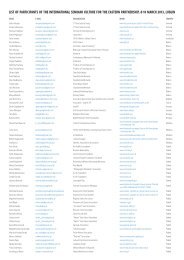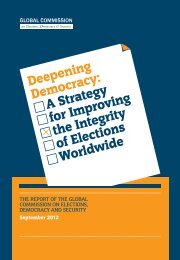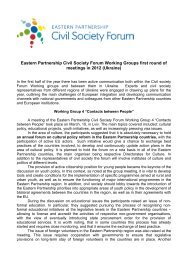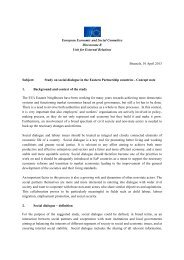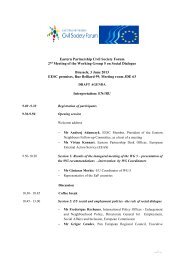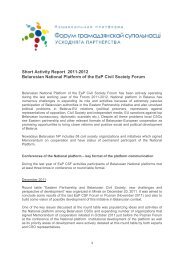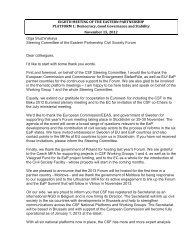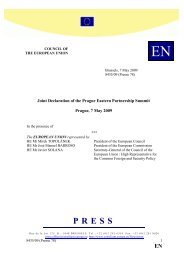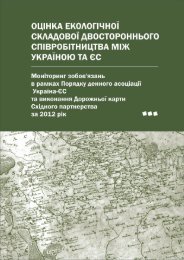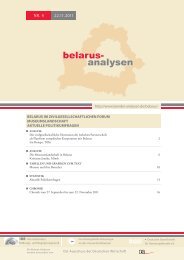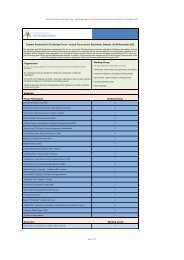Non-formal education - Eastern Partnership Civil Society Forum
Non-formal education - Eastern Partnership Civil Society Forum
Non-formal education - Eastern Partnership Civil Society Forum
Create successful ePaper yourself
Turn your PDF publications into a flip-book with our unique Google optimized e-Paper software.
life. Computer and language courses, entrepreneurial and small business programmes, Georgian<br />
language courses for national minorities may be taken as few examples of this.<br />
c) Civic Education gained special importance. Programmes for adults for civil peace and integration,<br />
conflictprevention and peaceful resolution, for encouraging active citizens develop fast and address needs<br />
of population in sustainable development. Through rather new topics as democracy, tolerance,interethnic<br />
relationships, active citizenship, gender, protection of the environment, healthylifestyle and others and<br />
by using interactive methodology non-<strong>formal</strong> Civic Education programmes influence big majority of<br />
population in Georgia and contributed to development of democratic society in the country.<br />
d) Changes in economy, shift to market economy, increased unemployment and high competition<br />
in finding jobs set one more priority: development and implementation of short-term training programmes<br />
in different fields and professions. The aim of such programmes delivered in non-<strong>formal</strong> settings and<br />
based on “learning by doing” methodology is to raise qualification of beneficiaries and promote their<br />
employment on a tight timetable.<br />
e) <strong>Non</strong>-<strong>formal</strong> <strong>education</strong> Adult Education addressing specific needs of different vulnerable groups<br />
within the society. Courses for the ethnic minorities to learn the state language; integration and social<br />
adaptation programmes for internally displaced persons and refugees; activities for citizens living<br />
in economically undeveloped regions; participants of migration processes, etc. are definitely newly<br />
established directions of non-<strong>formal</strong> <strong>education</strong> in Georgia.<br />
f) Youth non-<strong>formal</strong> <strong>education</strong>, including <strong>education</strong>al programmes for youth dropped out of schools<br />
and vocational <strong>education</strong> and lacking relevant skills and knowledge<br />
g) Literacy programmes. Although official data displays an adult literacy rate of 100 per cent (UNDP<br />
2008) there are signals of increased number of people (both Georgians and national minorities) who<br />
do not possess sufficient functional literacy skills. This definitely creates barriers for them to use their<br />
potential, to be employed and to enjoy fully their rights. <strong>Non</strong>-<strong>formal</strong> programmes organized in learner<br />
friendly atmosphere contribute to finding solution to this problem.<br />
h) More and more private structures are getting interested in raising qualification of their employees<br />
through non-<strong>formal</strong> <strong>education</strong> programmes: on-site <strong>education</strong>, weekend courses, etc. As the <strong>formal</strong><br />
system of retraining does not exist for the most of professions and occupations, non-<strong>formal</strong> <strong>education</strong><br />
structures strive to address this need as well.<br />
Against this backdrop the role of non-<strong>formal</strong> <strong>education</strong> should be strengthened as an effective<br />
tool in poverty reduction and sustainable development. However, despite the importance of non<strong>formal</strong><br />
<strong>education</strong> for a successful development, its place in the <strong>education</strong>al system of Georgia remains<br />
uncertain and in majority of cases is almost fully supported only by international donor community.<br />
At the same time there are several precedents illustrating increased interest of the government in<br />
non-<strong>formal</strong> <strong>education</strong>al programmes:<br />
Tbilisi City Hall Program – “Start Business with the support of Tbilisi City Hall”<br />
In collaboration with the “Open <strong>Society</strong> – Georgia” Foundation, USAID Small Enterprise Support<br />
Project, “Millennium Challenge Georgia” and the Investment Agency of Georgia Tbilisi city Hall started<br />
the program in 2006. The initiative provided trainings to obtain required entrepreneurship skills and<br />
funding opportunities, as well as business consultations aimed at developing of existing businesses.<br />
The program consisted of 3 phases. During the first phase, the applications have been submitted<br />
and training participants selected. In the second phase trainings were conducted, entrepreneurs were<br />
provided with consultations, projects were elaborated and selected. Registration, funding and additional<br />
consultations of entrepreneurs took place in the course of the final, third phase.<br />
This program is being currently implemented by Tbilisi City Hall, however excluding a training<br />
component. Submitted business project shall be commercially beneficial. Moreover, it shall facilitate<br />
the development of territories joining Tbilisi and Old Tbilisi; creation of job places; introduction of<br />
technological innovations; tourism development; enterprise development; supply of ecologically fresh<br />
product originated in various regions of Georgia to the customers in Tbilisi. There are no maximum and<br />
minimum limits for the loan. Interest rate for the preferential loan amounts to 10%, and the interest rate<br />
for issuing the loan – 0%. Credit time-line is 60 months. Preferential period for payment of the loan shall<br />
be determined on case-by-case basis, considering the specificities of concrete projects.<br />
57



